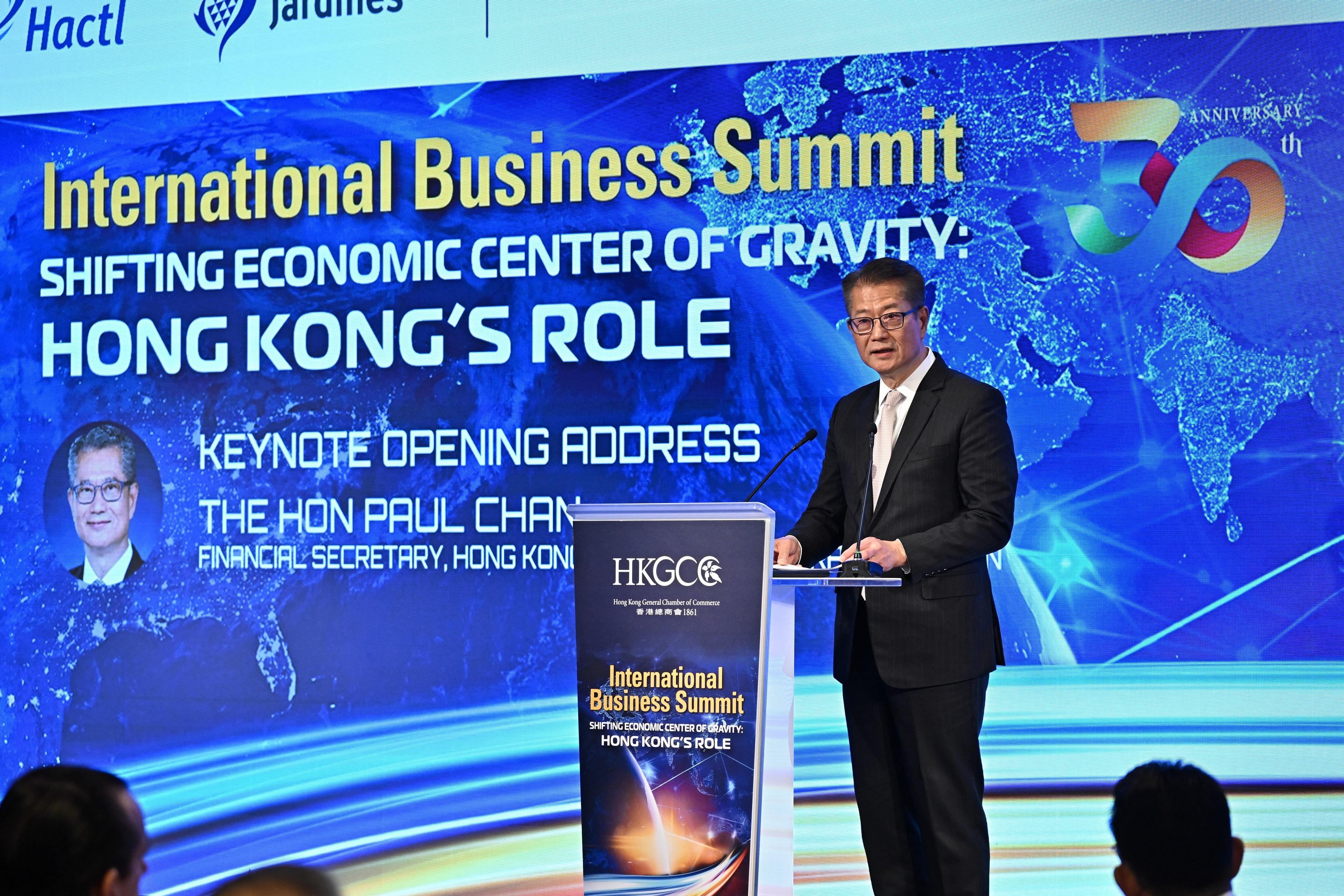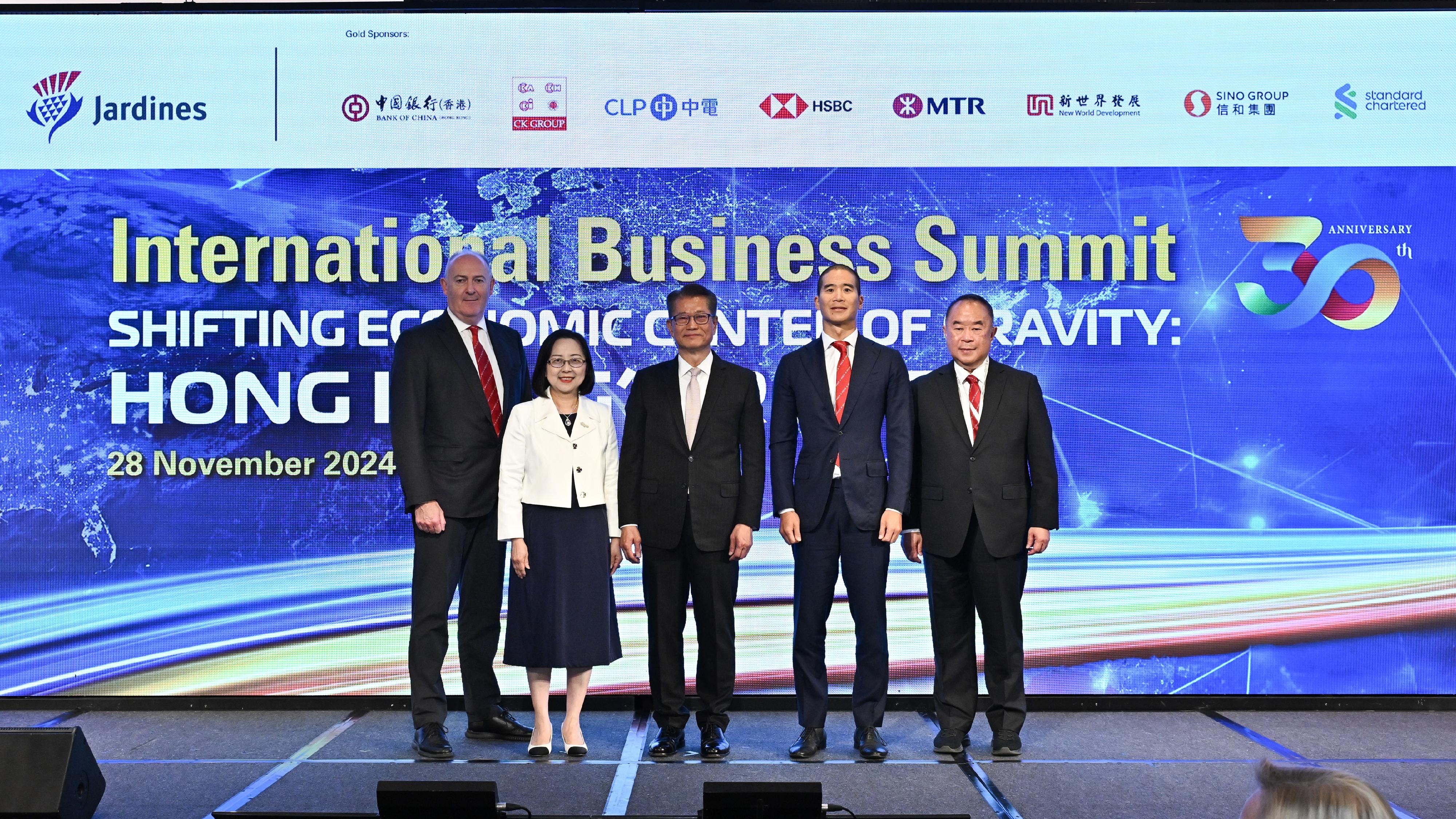Speech by FS at HKGCC International Business Summit (English only) (with photos/video)
Following is the speech by the Financial Secretary, Mr Paul Chan, at the HKGCC International Business Summit today (November 28):
Agnes (the Chairman of the Hong Kong General Chamber of Commerce, Ms Agnes Chan), Deputy Director-General Zhou Qiang (Deputy Director-General of the Economic Affairs Department and Head of the Commercial Office of the Liaison Office of the Central People's Government in the Hong Kong Special Administrative Region, Mr Zhou Qiang), Consulate Generals, distinguished guests, ladies and gentlemen,
Good morning. I am delighted to join you all for the International Business Summit today.
This year's edition marks the 30th anniversary of the Summit since its inauguration in 1994. Over the past three decades, the Summit has served as a valuable platform for government officials, industry leaders, members of the diplomatic community and local and foreign chambers of commerce, and to exchange ideas and share insights on a variety of topics, including business environment, technological advancement, and geopolitics.
Today's event puts a bright spotlight on Hong Kong's role under shifting economic gravity. This is just timely as Hong Kong, and our region as a whole, navigate a new wave of global challenges.
A New Wave of Global Challenges
These challenges are, of course, underscored by geo-economic fragmentation. Trends such as "de-risking", "on-shoring" and "friend-shoring" are reshaping the landscape of trade, investment, capital flows and talent flows. They will push up costs, stifle innovation, and disrupt talent exchange, detrimental to global economic progress. Now, the risks are looming larger, as the President-elect of the US (United States) expressed his intention, just this Monday, to impose tariffs not only on China, but also on its two neighbours.
Meanwhile, the world is grappling with higher for longer interest rates, and the clear and present danger of climate change. Both are hard hitting vulnerable populations. The United Nations' Sustainable Development Goals, which seek to eliminate poverty and hunger, provide inclusive education and clean water, and build sustainable, and resilient cities and communities, remain far off track.
The Rise of the Global South
While the challenges are daunting, there are encouraging developments. The dynamics of the global economy are shifting, with the Global South asserting greater influence. It now represents 85 per cent of the world's population and nearly 60 per cent of global GDP in terms of purchasing power parity. China, and other emerging markets like ASEAN, together account for over 60 per cent of global economic growth. Many of these countries are now undergoing structural transformation.
China is pursuing high-quality development, driven by innovation and technology as well as green transition. While international trade environment grows increasingly complex, China has capitalised on the domestic circulation strategy through leveraging its vast consumption market. In fact, China is transitioning from export-led growth to a model that integrates exports, infrastructure development, and private consumption. Recent measures, such as the replacement of domestic appliances, are expected to further stimulate demand.
As for ASEAN, the group has seen annual growth of four per cent over the past decade. With a combined population of over 680 million, it boasts a youthful workforce aspiring for better quality of life. In 2022, nearly half of them were under 30. ASEAN is on track to become the fourth-largest economy by 2030, and is emerging as a vast consumption market.
Then there is the Middle East. Many Gulf countries have set ambitious national development goals. They are investing heavily in infrastructure as well as innovation and technology to diversify their economic structures. These countries have vast resources to invest both locally and globally. In fact, six of the largest 12 sovereign wealth funds are owned by the Gulf countries.
The Role of Hong Kong and Opportunities Ahead
Ladies and gentlemen, these facts reveal that the world is rapidly changing. It may no longer look familiar. But that means opportunities for us, too.
The core competitive advantage of Hong Kong, after all, is the unique "one country, two systems" arrangement. It provides investors and businesses people with a trusted gateway and platform that connect not only China and advanced economies but also the rest of the world, including emerging economies.
Going forward, allow me to share three observations.
First, reinforcing and expanding our connectivity. Traditional markets like the US (United States) and Europe will remain our important sources of capital and investment, and they remain valuable partners with whom we need to further strengthen our ties. During my recent visits to the United States and several European countries, I observed some encouraging signs.
For instance, in the UK (United Kingdom), the new government is eager to re-establish dialogues with China. In the US, despite the growing tensions on the political front, we continue to see significant interest from the financial and business communities in investing in Hong Kong and doing business with China. There is also room for co-operation in various non-sensitive areas, such as infrastructure, green transition, ESG (environmental, social, and governance) and climate-related initiatives.
To tackle misconceptions and biases about Hong Kong, we need to engage proactively, by reaching out to these markets and telling the true Hong Kong story. We need to have more guests to visit Hong Kong so that they can see for themselves the opportunities here. This requires the concerted efforts of the entire Hong Kong team, business sector included.
At the same time, we are opening up more emerging markets. Recently, the delegation I led to Saudi Arabia witnessed the listing of two ETFs investing in the Hong Kong stock market. We signed new deals and co-operation agreements and showcased our promising startups. The "Hong Kong brand", which encompasses our entrepreneurs, world-class professional services, innovative tech solutions, and internationally aligned standards, is well recognised by these markets.
We need to build more bilateral and multilateral relations with emerging markets. This March, we signed an investment agreement with Bahrain, and earlier this month, we signed a free trade agreement with Peru. We have also commenced negotiations on investment agreements with countries like Bangladesh and Saudi Arabia. To capture market opportunities and strengthen both official relationships and people-to-people bonds, we will soon establish Economic and Trade Offices in Kuala Lumpur and Riyadh. The Hong Kong Stock Exchange will also open offices in some of these markets too.
Second, fast-tracking the development of our innovation and technology sector. Hong Kong has long been a leading international financial centre. Financial services will continue to be a key driver of our growth.
Another growth engine is innovation and technology. We concentrate on four strategic areas: AI (artificial intelligence) and data analytics, biotechnology, fintech, and new energy and materials. We take a multi-pronged approach. That includes providing support for research and development, nurturing startups, fostering cross-boundary and cross-industry collaboration, attracting strategic enterprises to Hong Kong, and partnering with sister cities in the Greater Bay Area.
A prime example of collaboration with the GBA is the I&T co-operation zone between Hong Kong and Shenzhen in the Lok Ma Chau Loop area. Just last week, the Government released a development outline for the Hong Kong Park in the co-operation zone, where we will experiment with innovative policies to facilitate the seamless flow of personnel, funds, and data. This will turn the Park into a truly unique ecosystem for innovation and technology, especially AI and biotech.
Third, realigning our role with the shifting industry chain and supply chain in the region. Many enterprises on the Mainland have realigned their industrial and supply chains across different countries in the Global South and along the Belt and Road. They need project and trade financing and effective management of their corporate treasury and logistics activities as well as professional consultancy. Hong Kong offers global capital and talent, and world-class professional services with extensive international connections. We are encouraging Mainland companies to establish international or regional business headquarters, corporate treasury centre, and supply chain management centre in the city. Hong Kong is a "super connector" and "super value-adder".
Closing Remarks
Ladies and gentlemen, it is true that we are navigating an uncertain world. But as a city that has always thrived on changes and challenges, Hong Kong has all it takes to prevail. For that, I'm confident. I'm sure the insights from all the other speakers in the Summit today will further illuminate the ample opportunities that lie ahead for Hong Kong, and for all our international partners.
Finally, I would like to thank the Hong Kong General Chamber of Commerce for organising this Summit.
I wish you all a successful Summit and the best of health and business in the years to come. Thank you very much.

